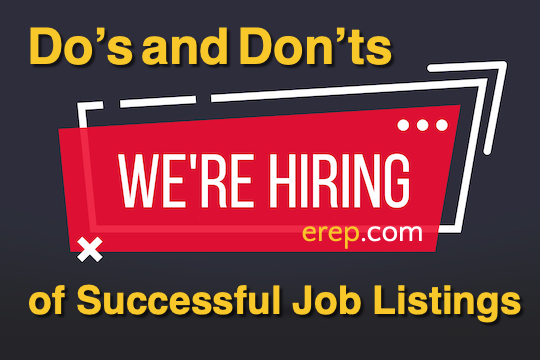Do's and Don'ts of Successful Job Listings
- By
- Steve Williamson, VP Digital Marketing and Content, eRep, Inc.
- Posted
- Monday, May 2, 2022

There are many ways to write a job listing. Some are effective and some that will turn candidates away faster than hornets at a picnic. We cover do's and don'ts that will make your job listings attract the attention of the best prospects.
Honesty
Don't deceive or mislead candidates. Be forthright and honest about what the job entails, what the work environment and expectations are, and don't bait-and-switch on compensation.
Also, leave out the hyperbole and marketing-speak. Skip the gimmicky "rock star" and "guru" descriptives — they don't work at motivating candidates to apply.
Competitive compensation
If you don't pay as much as the competition, why would you expect candidates to consider applying? Compensation is more than just salary, though. It is a package. If you can't (or won't) pay at least in the middle of the range for the job, how will you differentiate yourself from those who pay more?
Do you have great benefits? A generous vacation plan? Do you allow flexible work hours or work-from-home when the competition requires workers to commute into the office? What about other perks, like on-site childcare?
Learn what makes your compensation package attractive and state that honestly and clearly in your listing.
TOP TIP: A Canadian study found that companies that post pay information in their job listings get up to 90% more applicants.
Find a way to be competitive or you'll never be able to compete.
Clarity
Don't use word-salads in your job descriptions that are difficult for candidates to follow. Be clear about what they can expect during the selection process and after the hire. Anticipate common questions candidates may have and provide the answers in your job listing (without being too long-winded about it).
Don't make candidates have to guess about important aspects of the job or application process. Be clear about what is required and what is nice-to-have but optional.
Reasonable expectations
Are you insisting that candidates have an advanced degree but are only offering intern-level salaries? In order to even be considered are you expecting candidates to have five years of experience in a technology that has only existed for four? (We've seen that happen too many times.)
Another common mistake that kills the effectiveness of job listings are laundry lists of skills that any particular individual is very unlikely to posses. List what is actually required to do the job and leave out similar skills or technologies that are related but won't be used in the job.
One way to prevent this from happening is to have the supervisor of the position provide input on the job requirements — or even the bulk of the text — instead of someone that writes job listings but isn't familiar with the particular position (often someone in HR). Both should compose the listing together.
Brevity
Needlessly long job listings aren't convincing. In fact, they can be a turn off to candidates. Include what candidates need to know about the hiring process and about the job itself — what its requirements are and how much you're going to pay. Leave out the kitchen sink prose.
Consistency
If you're looking to hire a project manager, use that in the job title. Follow industry standards for the category the job most closely matches. If the opening is most similar to a Human Resources role, skip the "People Excellence Coordinator" or other one-off or cutesy variation, even if that's what you'll put on their business card after the hire.
Anyone searching for a Human Resources Professional position won't find "People Excellence Coordinator" in their job board searches, and the job boards probably won't find or correctly categorize the job listing, either.
Use standardized terminology in the description and body of the job listing. This includes jargon specific to technologies or skills required for the job. If you're looking for software developers skilled in a language that happens to be offered by more than one company, use the generic name for the language unless the brand name truly matters (and isn't just a 'nice to have.')
Bonus Tip
Be aware that many job listings today include biased language that can turn off otherwise qualified candidates, often without the employer being aware it's happening. Tap into talent acquisition experts to review your job listings to make sure you're not turning away great talent.
Go to eRep.com/core-values-index/ to learn more about the CVI or to take the Core Values Index assessment.

Steve Williamson
Innovator/Banker - VP Digital Marketing and Content, eRep, Inc.
Steve has a career in project management, software development and technical team leadership spanning three decades. He is the author of a series of fantasy novels called The Taesian Chronicles (ruckerworks.com), and when he isn't writing, he enjoys cycling, old-school table-top role-playing games, and buzzing around the virtual skies in his home-built flight simulator.
View additional articles by this contributor
Share This Article
Essentials
Additional Reading
Stay Updated
Employer Account Sign-up
Sign up for an employer account and get these features and functions right away:
- Unlimited Job Listings on eRep.com
- Applicant Search
- Applicant Tracking System (ATS)
- Unlimited Happiness Index employee surveys
- 3 full/comprehensive CVIs™
- No credit card required — no long-term commitment — cancel at any time
Write for eRep
Are you interested in writing for eRep? Read our submission guidelines.
